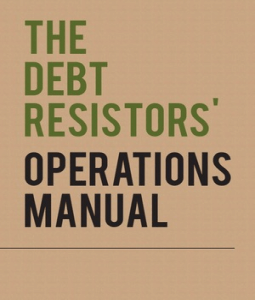
Graeber lays out the historical development of the idea of debt,
starting from the first recorded debt systems that existed in the
Sumer civilization around
3500 BC.
In this early form of borrowing and lending, farmers would often become
so mired in debt that their children would be forced into
debt peonage,
though they were periodically released by kings who canceled all debts
and granted them amnesty under what later came to be known, in ancient
Israel, as the Law of
Jubilee.
Throughout antiquity, the author identifies many different systems of
credit and later monetary exchange, drawing from historical and also
ethnographical records evidence for his argument that the traditional
explanation for the origins of monetary economies from primitive
bartering system, as laid out by
Adam Smith,
doesn't find empirical support. One feature first observed in this
period, though - that of popular indebtedness leading to unrest,
insurrections and revolts - will accompany the narrative of the whole
book as it deals with the origins of the state, money, interest,
taxation and slavery.
The author supports that originally credit systems developed as means of account much before the advent of coinage around
600 BC,
and can still be seen operating in non-monetary economies. The idea of
barter, on the other hand, seems only to apply for limited exchanges
between different societies that held no frequent contact and often were
in a context of ritualized warfare, rendering its conceptualization
among economists as a myth. As an alternative explanation for the
creation of economic life, the author suggests that it originally
related to social currencies, closely related to non-market quotidian
interactions among a community and based on the "everyday communism"
that is based on mutual expectations and responsibilities among
individuals. This type of economy is, then, contrasted with the moral
foundations of exchange, based on formal equality and reciprocity (but
not necessarily leading to market relations) and hierarchy, based on
clear inequalities that tend to crystallize in customs and castes.
With the advent of the great Axial Age civilizations, the nexus
between coinage and the calculability of economic values was concomitant
with the disrupt of what Graeber calls "human economies," as found
among the
Iroquois,
Celts,
Inuit,
Tiv,
Nuer and the
Malagasy people of
Madagascar
among other groups which, according to Graeber, held a radically
different conception of debt and social relations, based on the radical
incalculability of human life and the constant creation and recreation
of social bonds through gifts, marriages and general sociability. The
author postulates the growth of a "military-coinage-slave complex"
around this time, through which mercenary armies looted cities and human
beings were cut from their social context to work as slaves in Greece,
Rome and elsewhere in the Eurasian continent. The extreme violence of
the period marked by the rise of great empires in China, India and the
Mediterranean was, in this way, connected with the advent of large scale
slavery and the use of coins to pay soldiers, together with the
obligation enforced by the State for its subjects to pay its taxes in
currency. This was also the same time that the great religions spread
out and the general questions of philosophical enquiry emerged on world
history - many of those directly related, as in Plato's Republic, with
the nature of debt and its relation to ethics.
When the great empires in Rome and India collapsed, the resulting
creation of a checkerboard of small kingdoms and republics saw the
gradual decline in standing armies and cities, as well as the settlement
of the lower classes through various hierarchical caste systems, the
retreat of gold and silver to the temples and the abolition of slavery.
Although hard currency was no longer used in everyday life, its use as a
unit of account and credit continued in medieval Europe, against
popular claims among economists that the Middle Ages somehow saw the
economy "revert to barter". In fact, it was during the Middle Ages that
more sophisticated financial institutions like promissory notes and
paper money (in China, where the empire managed to survive the collapse
observed elsewhere), letters of credit and cheques (in the Islamic
world) developed and spread. According to Graeber, it was the Islamic
"western" tradition of free market and commerce outside of governmental
intervention that inspired the original formulation of
Adam Smith, whose writing seems to repeat ipsis litteris the words of Persian scholars like
Al-Tusi and
Al-Ghazali.
It took the emergence of the Atlantic slave trade and the massive
amounts of gold and silver extracted from the Americas - most of which
ended up in the far East, specially China - to see the reemergence of
the bullion economy and large scale military violence. All of which,
according to Graeber, directly inter-wined with the earlier expansion of
the Italian mercantile city-states as centers of finance that defied
the church ban on usury and led to the age of the great capitalist
empires that endured and prospered for the next 500 years. As the new
continent opened new possibilities for gain, it also created a new area
for adventurous militarism backed by debts that required the economic
exploitation of the Amerindian and, later, West African populations. As
it did, cities again flourished in the European continent and capitalism
advanced to encompass larger areas of the globe when European trade
companies and military outposts disrupted local markets and pushed for
colonial monopolies.
This age would have come to an end with the abandonment of the gold
standard by the U.S. government in 1971 and a return to credit money,
opening up uncertainties and possibilities yet unclear as the dollar
stands as the world currency largely based in its capacity to multiply
itself through debts and deficits as long as the United States maintains
its status as the world only military power and client states are eager
to pay seignorage for its government bonds. By comparing the evolution
of debt in our times to other historical eras and different societies,
the author suggests that modern debt crises are not the inevitable
product of history and may be changed.









































